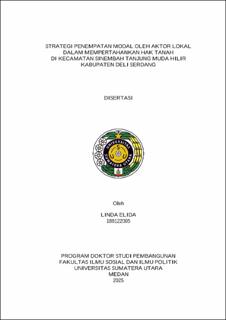| dc.description.abstract | Agrarian conflict arising from the expansion of oil palm plantations has become one of the most complex issues in the dynamics of rural social life in Indonesia. This dissertation stems from a concern over the widespread dispossession of local communities' living spaces through state-sanctioned legal-formal mechanisms, often neglecting historical community rights to land. The study focuses on STM Hilir Subdistrict, Deli Serdang Regency, aiming to reveal how local communities have acted not only as victims but also as active agents in the reclaiming movement against land previously claimed by the state-owned company, PTPN (Perseroan Terbatas Perkebunan Nusantara) II. Theoretically, this research is grounded in Pierre Bourdieu’s structural-constructivist approach, emphasizing the concepts of field, capital (economic, social, cultural, and symbolic), and habitus. This approach enables the interpretation of agrarian conflicts as complex arenas of social contestation, where various forms of capital are deployed and contested, beyond mere struggles over material resources. Relevant literature on conflict resolution, capitalist agrarian structures, forum shopping strategies, and peasant identity dynamics further strengthens the conceptual framework of this study. The research adopts a qualitative methodology with a case study design, utilizing in-depth interviews observations, and analysis of legal and historical documents. Data were analyzed thematically with source triangulation to ensure the validity and reliability of findings. The results show that the community of STM Hilir developed complex strategies for the deployment and conversion of capital to defend their land claims. Cultural capital was mobilized through mastery of agrarian law and historical documentation; social capital was strengthened through community solidarity and expanded external networks; symbolic capital was generated through the support of customary and religious leaders; while economic capital was developed through the establishment of farmer cooperatives and the management of reclaimed agricultural production. These strategies unfolded across three phases: pre-reclaiming, reclaiming, and post-reclaiming. The findings indicate that the success of the community's struggle is not solely determined by the volume of capital possessed but by tactical intelligence in positioning and converting capital according to the dynamics of the conflict field. The novelty of this study lies in its systematic application of Bourdieu’s theory to local agrarian conflict, highlighting the internal capacities of the community as the primary agents of change, and developing a typology of actor strategies based on conflict stages. There is a new concept called "Reclaiming De Facto". Key recommendations include the necessity for state recognition of local forms of land ownership, strengthening of community-based economic systems rooted in internal solidarity, and encouragement for scholars and civil society organizations to develop participatory, transformative, and context-sensitive approaches to conflict resolution. | en_US |


